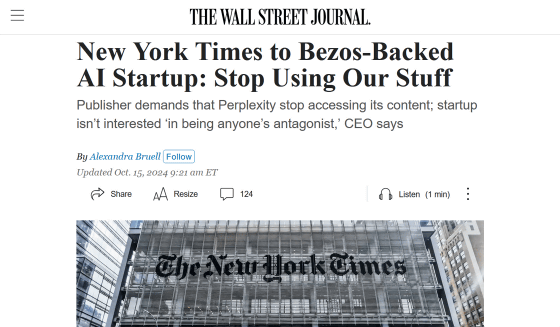The New York Times demands that AI startup Perplexity halt access to and use of its content

The New York Times, a major daily newspaper, has sent a cease and desist letter to Perplexity , an AI startup that develops a search engine that uses generative AI, demanding that the company stop accessing and using its content.
Exclusive | New York Times Tells Perplexity to 'Cease and Desist' From Content Scraping, Joining Uprising Against AI Startup - WSJ
https://www.wsj.com/business/media/new-york-times-to-bezos-backed-ai-startup-stop-using-our-stuff-20faf2eb

NYT sends AI startup Perplexity 'cease and desist' notice over content use | Reuters
https://www.reuters.com/technology/artificial-intelligence/nyt-sends-ai-startup-perplexity-cease-desist-notice-over-content-use-wsj-reports-2024-10-15/
The New York Times warns AI search engine Perplexity to stop using its content - The Verge
https://www.theverge.com/2024/10/15/24270774/new-york-times-cease-and-desist-letter-perplexity-ai-search-engine
Perplexity is an AI startup backed by Amazon founder Jeff Bezos and others. It offers a service that searches the internet for information about a user's text question and uses AI to respond in the form of a report, article, or dialogue.
According to documents reviewed by The Wall Street Journal, the New York Times sent Perplexity a cease and desist letter, demanding that the company stop accessing and using its content.
The New York Times' move joins other lawsuits filed by the company against OpenAI and Microsoft for copyright infringement , and Forbes, which has accused Perplexity of providing Forbes articles with 'minimal attribution.'
AI search engine 'Perplexity' is accused of using AI to compile parts of articles from Forbes and other sites and republishing nearly identical content with minimal attribution - GIGAZINE

'Perplexity and its business partners have unfairly profited from their unauthorized use of The Times' expressive, carefully researched, written and edited journalism,' the New York Times' letter said.
The New York Times also complained that Perplexity had not followed the robots.txt file that it had said would prevent websites from being scraped. As of October 2, when the letter was sent, the New York Times' articles were still appearing in Perplexity's search results.
In response to a Wall Street Journal inquiry, Perplexity CEO Aravind Srinivasa said the company is not ignoring robots.txt and plans to comply with the New York Times' deadline of October 30. 'We're interested in working with all publishers, including The New York Times. We're not interested in antagonizing anyone here,' Srinivasa said.
On the other hand, Perplexity said in a statement, 'We don't scrape data to build underlying models. We index web pages and publish factual content as citations to answer users' questions. The law recognizes that no organization owns a copyright on facts. This enables a rich and open information ecosystem, and it's why one news organization can cover a topic that was previously covered by another.' They claim that there is no copyright issue with what they do.
In recent years, news organizations have also shown a willingness to embrace AI development companies, and News Corp, the parent company of The Wall Street Journal, has signed a contract with OpenAI to receive compensation in exchange for providing content to the company. Perplexity also has contracts with individual publishers, but the compensation amounts are not as attractive as those offered by major companies such as OpenAI.
Perplexity, whose AI search results were found to be plagiarized, launches a program to share advertising revenue with major media outlets - GIGAZINE

Related Posts:
in Software, Web Service, Posted by log1h_ik







